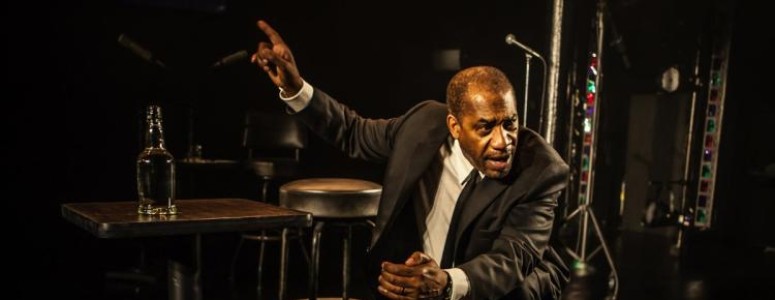All right, all you Drama Desk, Lucille Lortel and Outer Critics Circle Awards nominators. Get out those iPhones, Filofaxes or whatever you use to remind yourself of a future important date.
Make a note right now for next spring: “Don’t forget Joe Morton as Dick Gregory in TURN ME LOOSE when we meet to discuss awards.”
Two or three hundred shows from now, I don’t want Morton’s achievement to slip your minds. That’s easy to do for a production that opened only a matter of days after the 2015- 2016 awards season came to a close and is 11 full months away from any heated discussions of who should and should not be nominated. For Morton MUST be kept in mind for The Best Solo Show of 2016-2017.
Perhaps I’m worrying too much. What’s more likely is that all of you Grand Poobah nominators (and everyone else) who catch Morton at the Westside Theatre will long remember his riveting performance. Maybe not now and forever, I’ll concede, but damn close to it.
Who knows how much guidance director John Gould Rubin provided. What we DO know is that playwright Gretchen Law has given Morton a terrific topic in Dick Gregory. The civil rights activist, social critic and – oh, yes – comedian was born on Oct. 12, 1932 – 440 years to the day on which Columbus discovered America. And therewith hangs an irony, for Gregory has lived in an America that hasn’t fully treated him or his fellow blacks as true Americans.
Morton understands Gregory’s mojo. He starts off as if he’s just another comedian who’ll go the route of “A funny thing happened to me on the way to the club tonight.” Once he’s made the audience laugh enough and has made most everyone like him, he slowly but ever-so- surely gets to the meat of the matter.
Some of that meat is really rancid. Many a story will surprise or even shock those who didn’t live through those unenlightened pre-Civil Rights times. This was the era when THE TONIGHT SHOW would have blacks on the broadcast but – believe it or not – wouldn’t allow them to sit on the couch after they’d chatted with the host or performed.
Although this dictum offended Gregory to the nth degree, he had to weigh his feelings against the career-boost he’d receive from national network exposure. Morton shows us just what Gregory was made of in one of the show’s most moving segments.
Long before Tracy Turnblad In HAIRSPRAY wished that “Every day could be Negro Day,” Gregory was wondering why blacks had to settle for Brotherhood WEEK and therefore be ignored or insulted for the other 51 weeks of the year. The look Morton gives while delivering this message demands an answer. We’re too shocked and shamed to give him one as soon as we realize that this has never occurred to us.
If Morton were playing one part of Gregory’s life, he’d have a difficult assignment. Instead, the playwright has made it harder for him by making the show travel through time. It starts in the ‘60s, zooming to the here and now, returning to earlier eras and then forward again. So Morton both ages and youthens during the 90-minute intermissionless show. Projections on the back wall tell us what year it is, but just a glance at Morton’s eloquent body language tells us what age he is. In the scenes set in 2016, he adopts a posture infused with such osteoporosis that he could become a poster child – nay, poster senior citizen – for the disease.
It’s not the worst one, Gregory insists. Morton squares his jaw before declaring that “Racism is the worst disease.” He’ll prove it through Gregory’s pungent observations before the night is through. For Gregory has long encapsulated the lifestyles of many African-Americans in single but potent lines: “I want to take my babies to the doctor BEFORE they get sick” is powerful enough. Still, even such a sobering observation doesn’t remotely approach the horrifying statistic that “There are more black people now in prison that were ever enslaved.” The stare and silence that Morton then gives the audience makes Gregory’s point sink in: African-Americans still run the risk of being enslaved, but in a different and, in fact, less liberated way. No wonder that such remarks are followed by Morton’s looking at the audience and somehow letting us see the fear inside him when he blatantly says “I hope I get out of here alive tonight.”
Here’s hoping that some finicky parliamentarian by-laws of the Drama Desk, Lucille Lortel and Outer Critics Circle won’t exempt Morton from consideration in the Best Solo Show category because actor John Carlin spends a few minutes “opening” for Gregory and later plays a heckler who’s a racist from Alabama. Hearing his ignorance is shocking enough, but then when he’s later established as a teacher, we really get chills. What does he say to schoolchildren five days a week?
The chills can’t compare, however, to the ones that Joe Morton gives us in delivering the witty, wise and oh-so- truthful statements that Dick Gregory has made for most of his life. It’s time we hear them once again, especially because we may never hear them so overpoweringly delivered.




